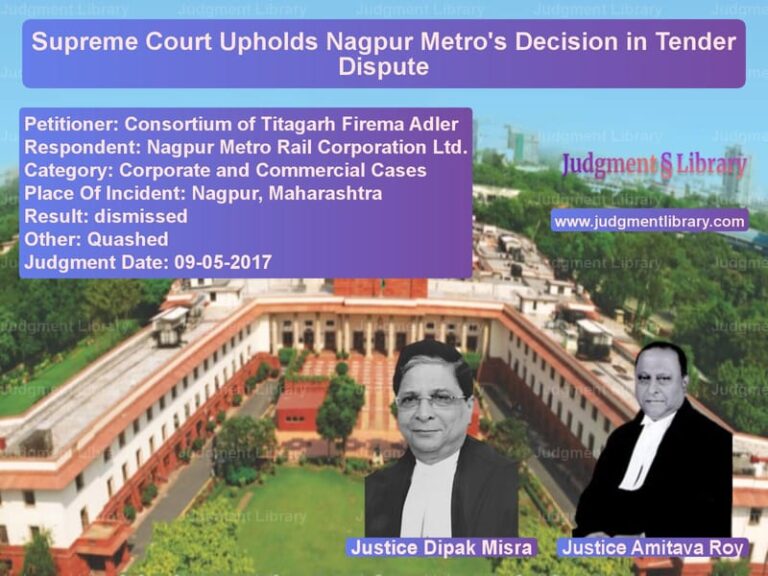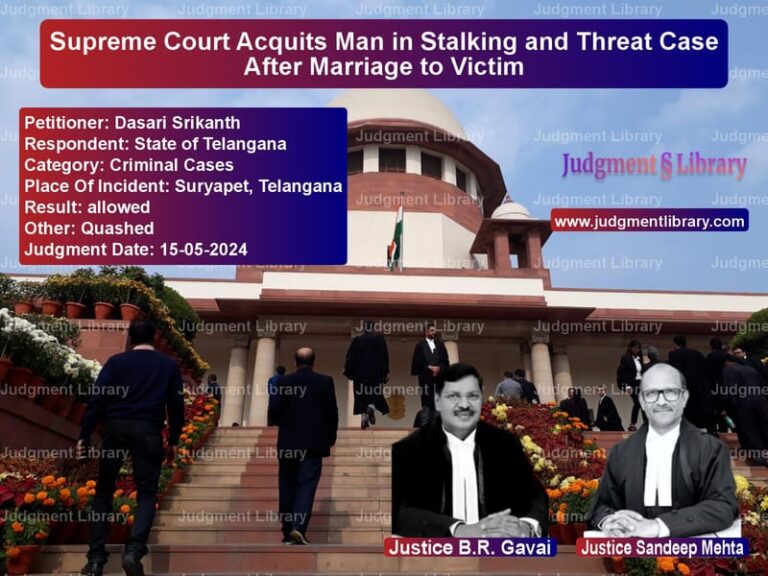Quashing of Criminal Proceedings in Non-Compoundable Offences: Supreme Court’s Landmark Ruling
The case of Ramgopal & Anr. vs. The State of Madhya Pradesh and Krishnappa & Ors. vs. The State of Karnataka addressed the issue of whether criminal proceedings involving non-compoundable offences can be quashed based on a compromise between the accused and the complainant. The Supreme Court, in its ruling, provided clarity on the extent of inherent powers of the High Court under Section 482 of the Code of Criminal Procedure (Cr.P.C.) and the power of the Supreme Court under Article 142 of the Constitution.
Background of the Case
Both appeals involved offences categorized as non-compoundable under Section 320 of the Cr.P.C. The appellants in both cases sought quashing of the criminal proceedings on the ground that they had reached a settlement with the complainants. While the High Courts had denied their requests, the appellants approached the Supreme Court to invoke its powers under Article 142 to quash the criminal proceedings.
Facts of Criminal Appeal No. 1489 of 2012
- The case originated from an FIR registered on November 3, 2000, in Madhya Pradesh.
- The dispute arose due to a monetary issue, leading to an altercation where the complainant was assaulted.
- The accused were convicted under Sections 294, 323, and 326 read with 34 of the Indian Penal Code (IPC) and sentenced to three years’ imprisonment.
- During the pendency of their appeal, the accused and the complainant reached a compromise.
- The Sessions Court accepted the compromise for offences under Sections 294 and 323 IPC but upheld the conviction under Section 326 IPC, as it is a non-compoundable offence.
- The High Court reduced the sentence to the period already undergone but refused to quash the conviction.
- The appellants then approached the Supreme Court seeking complete quashing of the conviction.
Facts of Criminal Appeal No. 1488 of 2012
- The incident took place in Karnataka in 1995, where the complainant was assaulted and left unconscious.
- The accused were convicted under multiple sections of the IPC, including Sections 143, 144, 147, 148, 342, 324, and 326.
- The High Court upheld their conviction.
- The appellants sought quashing of the conviction based on a settlement with the complainant.
Legal Issues Raised
- Whether non-compoundable offences can be quashed based on a compromise between the accused and the complainant.
- The scope of inherent powers of the High Court under Section 482 Cr.P.C. in quashing criminal proceedings.
- The Supreme Court’s power under Article 142 of the Constitution to do complete justice.
Petitioner’s Arguments
The appellants contended:
- That the dispute was personal in nature and had been amicably settled.
- That the complainants had no objection to quashing the proceedings.
- That continuing the prosecution would serve no purpose and would be a mere formality.
- That in cases where the dispute is personal and does not affect society at large, the Court should exercise its powers to quash the proceedings.
Respondent’s Arguments
The State opposed the quashing of proceedings, arguing:
- That offences categorized as non-compoundable under the law should not be quashed solely based on a compromise.
- That the law distinguishes between compoundable and non-compoundable offences for a reason.
- That the High Court had correctly refused to quash the conviction, as it lacked the authority to do so.
Supreme Court’s Judgment
The Supreme Court referred to its previous rulings, including Gian Singh vs. State of Punjab, where it had ruled that while courts have the power to quash proceedings in non-compoundable offences, this power must be exercised cautiously.
The Court held:
- “The power of the High Court in quashing a criminal proceeding or FIR or complaint in exercise of its inherent jurisdiction is distinct and different from the power given to a criminal court for compounding offences under Section 320 of the Code.”
- “Before exercising such power, the High Court must have due regard to the nature and gravity of the crime.”
- “Heinous and serious offences like murder, rape, and dacoity cannot be quashed even if there is a settlement between the accused and the victim.”
Applying these principles, the Supreme Court ruled:
- That since the offences in question were not of a heinous nature, they could be quashed based on a compromise.
- That continuing the proceedings would not serve any public interest.
- That quashing the proceedings would promote harmony and peace.
- That in Criminal Appeal No. 1489 of 2012, the conviction was quashed.
- That in Criminal Appeal No. 1488 of 2012, the appellants were directed to appear before the Chief Judicial Magistrate to record their settlement before a final decision could be made.
Implications of the Judgment
- Strengthens the principle that courts have the discretion to quash non-compoundable offences if they are of a private nature.
- Clarifies that the power to quash criminal proceedings should be exercised cautiously and in the interest of justice.
- Encourages alternative dispute resolution mechanisms in criminal law.
Conclusion
The Supreme Court’s ruling in Ramgopal & Anr. vs. The State of Madhya Pradesh and Krishnappa & Ors. vs. The State of Karnataka sets an important precedent in Indian criminal jurisprudence. It reaffirms that courts must balance legal principles with the realities of human relationships and societal harmony. By allowing quashing of criminal proceedings in cases where the dispute is personal and does not impact society at large, the Court has furthered the cause of justice and peace.
Petitioner Name: Ramgopal & Anr., Krishnappa & Ors..Respondent Name: State of Madhya Pradesh, State of Karnataka.Judgment By: Justice N.V. Ramana, Justice Surya Kant.Place Of Incident: Madhya Pradesh, Karnataka.Judgment Date: 29-09-2021.
Don’t miss out on the full details! Download the complete judgment in PDF format below and gain valuable insights instantly!
Download Judgment: ramgopal-&-anr.,-kri-vs-state-of-madhya-prad-supreme-court-of-india-judgment-dated-29-09-2021.pdf
Directly Download Judgment: Directly download this Judgment
See all petitions in Bail and Anticipatory Bail
See all petitions in Attempt to Murder Cases
See all petitions in Fraud and Forgery
See all petitions in Theft and Robbery Cases
See all petitions in Judgment by N.V. Ramana
See all petitions in Judgment by Surya Kant
See all petitions in allowed
See all petitions in supreme court of India judgments September 2021
See all petitions in 2021 judgments
See all posts in Criminal Cases Category
See all allowed petitions in Criminal Cases Category
See all Dismissed petitions in Criminal Cases Category
See all partially allowed petitions in Criminal Cases Category







